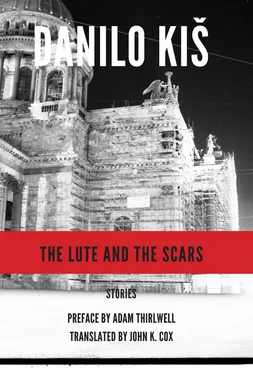At that point the telephone rang. He started conversing with someone in German.
Why the hell had I told him about my encounters with those “Yugoslav gangsters” in Montparnasse? I wondered. Besides, he’d blown it out of proportion. They were for the most part friends from my high school years, and when I got together with them, they were hardly packing any weapons. Or, at any rate, I never saw any in their possession. They just told me stories. About a guy who’d just come out of Le Select, or about someone they claimed I knew (“the tall fellow with the moustache”), since we had sat at the same table the day before yesterday. This man had gotten stabbed to death the other day at the Place Pigalle. Yet another guy killed two Corsicans with his pistol a few days earlier. Or he had been shot dead himself — I don’t remember anymore. A third got eight years: for smuggling weapons, and robbery, and pimping.
“One of my friends,” Jurij Golec said when he returned to the table. “Hasn’t left his house for ten years now. He tried to kill himself; the Metro took off both his legs above the knee. He lives on the eighth floor, but he lacks the courage to try it again. He drinks. Takes pills. And waits for death. Is that how you all want it to be for me?”
“I’ll get a pistol for you,” I said. “A year from now. On May 8, 1983. I have experience with things like this.”
“In a year?” he said. “I won’t be able to stand it for a month. Not for a week.”
“In a year, in the event that you still have need of one.”
“I thought you were different from the French. But you’re just like all the rest. You don’t understand me either. Why should I. ”
“Because you survived the camps.” (He had a number tattooed on his forearm.) “That’s why. Someone who’s lived through the camps. ”
“Leave the camps out of this,” said Jurij Golec. “Compared to this, the camp was a joy. Even Raoul, that unfortunate creature without legs, survived the camps.”
We were already on the second bottle of cabernet sauvignon. It was then that I noted the wine was going to my head and that I was hungry; all I’d had for breakfast was coffee. I suggested we go out for a bite to eat. Or we could have a proper lunch together. I was sure he hadn’t eaten anything.
“I’ll take you someplace,” he said. “Let’s go eat, somewhere close by. I have to be back here by five at the latest. A couple of people are coming by. And the clerks from the court could show up at any time. Oh, for the day when all these formalities are complete!”
We walk through the passage and come out on the boulevard. The air is cool, although from time to time the sun breaks through the clouds. One can feel spring’s incremental victory; the tables have been put out on the sidewalks; the women are sitting facing the sun, with their eyes closed and skirts pulled halfway up their thighs. A black man in shorts swishes past us on roller skates and then zips across the street. I watch as he goes out of sight into the Jardin du Luxembourg; on the gilded tips of the fence around the park the sun is leaving blood-red traces, like on some gaudy painting in the Louvre.
The restaurant has been recently renovated, and it still smells new. Lamps with red shades and gold tassels hang in the booths. Paper tablecloths cover the plastic tables. In the vases, artificial flowers, and next to them, in a metal rack, the holy trinity of French cuisine: salt-pepper-mustard.
In one of the alcoves, the restaurant owners are dining, a heavy blonde woman with painted fingernails and a corpulent red-faced man with a little moustache. With large knives they are slicing up bloody steaks. A bottle of red wine, unlabeled, stands on the table before them; the bottle is imprinting the paper tablecloth with red half-circles.
They greet us with handshakes.
“ Ça va ?”
“ Ça va ,” says Jurij Golec.
“How’s Madame?” asks the proprietress.
“She has died,” says Jurij Golec.
The owner takes a swallow of wine.
“But it hasn’t even been a week since Madame was here,” he says.
“ Mon Dieu, mon Dieu . Automobile accident?”
“Leukemia,” says Jurij Golec. “We’d like something to eat.”
“Have a seat there,” the owner says, pointing to a table with his knife. “Or there. Gaston! Bring these gentlemen a menu. Yes, such is life. It just seems as if Madame had sat here only yesterday. Right there where you are sitting now. I’m afraid we’re out of menus d’hors . It’s three o’clock. I recommend you get the roast beef. Gaston!”
“Chicken for me,” Jurij Golec says. “With fries. And a salad. She’s been dead a month already.”
“And what will your friend be having?”
“An omelet,” I say. “And a carafe of red wine.”
“None for me,” Jurij Golec says. “I don’t drink.”
“Madame always took such good care of herself,” says the proprietress. “Only ate healthy things. Eggs, fish, vegetables. And lots of carrots. Gaston, bring the man a fork.”
“In the last few years,” says Jurij Golec, leaning in my direction, “she ate only grass. Like a cow.”
We went back to Noémie’s apartment. On the way Jurij bought himself three cartons of Rothmans — ten days’ supply, at least. He paid for my cigarettes, too.
“I also smoked Gauloises and Gitanes for years,” he said. “Until I got French citizenship. I smoked that trash so I’d have the same taste in my mouth they have.”
We had no sooner returned than he started in again:
“So then what you want is for me to hurl myself under a subway train, like miserable old Raoul. Don’t interrupt me, please. Is that what you all want to become of me? And I, as you can see, am not in any condition to open up my own veins. I am horrified by the sight of blood, like the hero of your novel. Especially now. For a whole month I went to be with her in the hospital every day. I greeted the dawn at her bedside. With no tobacco or alcohol. I don’t intend to go on and on to you about all that. About the blood, the vomit, the excrement, the pus. We were married for thirty-three years. We met in Poland, after we were released from the camps. She was on her way back from a Russian camp, I from a German one. ”
“For the last twenty years we didn’t live under the same roof. In that length of time I slept with a lot of women; I assume she took lovers as well. How many? I don’t know. But there was nonetheless something that bound us together. Something elemental. Whatever it is that unites a man and a woman forever.”
The telephone rang, and he chatted with someone else in German, quietly. Either German or Yiddish. Then he returned to his seat opposite me. “A month before she got sick, we went for a stroll on the Boulevard Saint-Michel. It was a clear day, like this one. At one point she stopped and took my hand. ‘I would like to live a hundred years,’ she said. ‘With you.’ And we kissed. On the lips.”
Jurij Golec drank a swallow. “A splendid bottom line for an old Jewish couple,” he concluded. “After thirty-three years of shared life.”
“It would be a good idea for you to go away somewhere,” I said. “What’s the status of the will anyway?”
“There is the possibility that she left me nothing. I don’t care. I only want the paperwork to be done with. But none of that is important now. I’m done for. I helped a few people. Slept with ten women. Maybe it was a hundred. I wrote this and that, might as well have been writing with my finger in water. I have no strength left, and no curiosity.”
“I understand how you feel. I leaned out over the edge of this abyss recently too. People don’t know what advice to give, and God, if you don’t mind my saying, doesn’t know His way around in such matters. At that time I started searching for books that would give me strength to keep on living. And I arrived at the tragic conclusion that all the books I had devoured over the decades were of no use to me in that decisive hour. I’ll omit the holy books and the sages of old; I wasn’t receptive to them, because I lacked the basic prerequisite of a belief in God, which you yourself have. I read the widest variety of authors and works: Gnostics and gnostic commentaries, Surviving and Other Essays by Bruno Bettelheim, Linden’s Autogenic Training, Les destins du plaisir by a certain Aulagnier, Goethe’s Elective Affinities, La nuit, le jour by Braunschweig, Herbert Rosenfeld’s Psychotic States , the novels of Philip Roth, and even Hjalmar Bergman’s Marionettspel , because I myself resemble a puppet whose strings are controlled by fate. The only thing I got from all this reading was the realization that books provide no answers to burning questions. That we are directed by our genes, the devil, or God, and that our will plays no role at critical moments, that we are simply knocked this way and that by our various passions. As when someone is swimming hard and the shore not only recedes but actually seems to gape wide, as the current — for you are swimming upstream — carries you in the opposite direction. But, fortunately, passions, like misfortunes, are transient; like all plants and animals too. ”
Читать дальше












